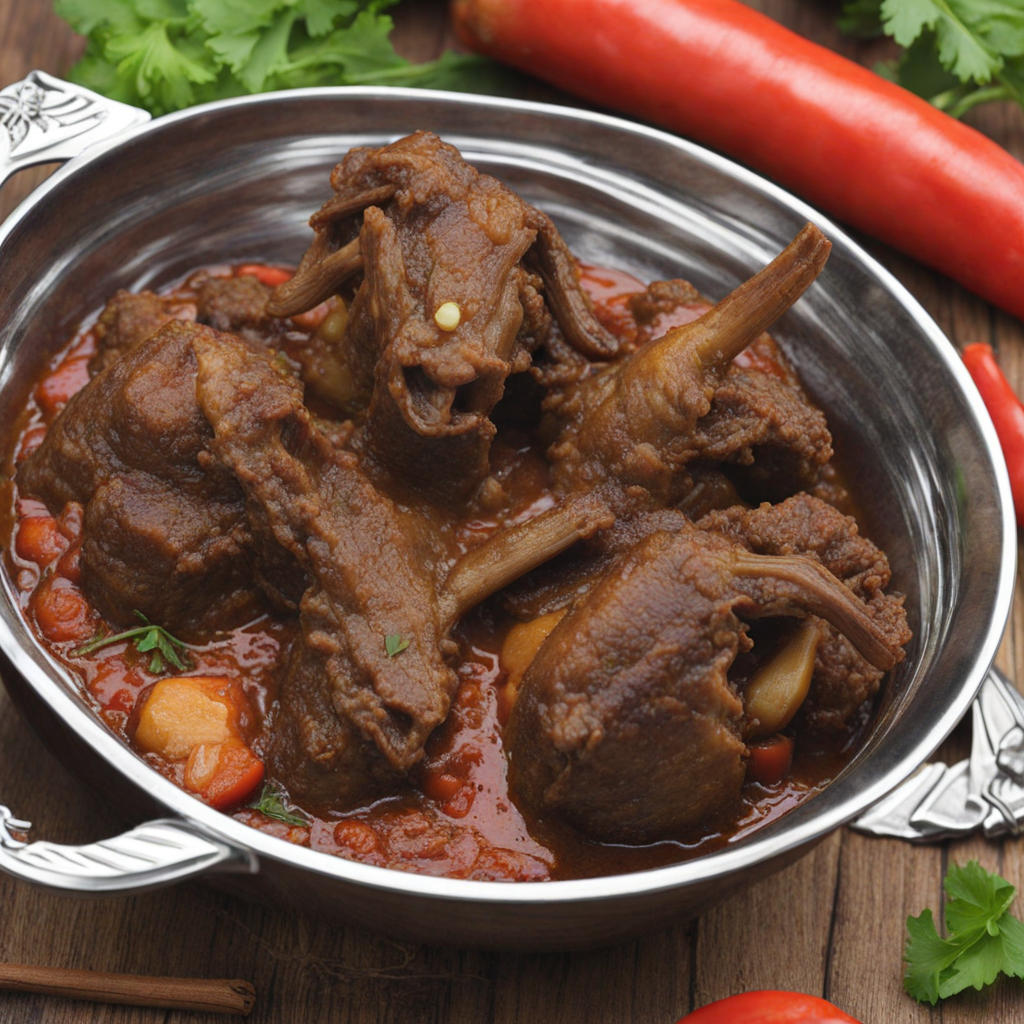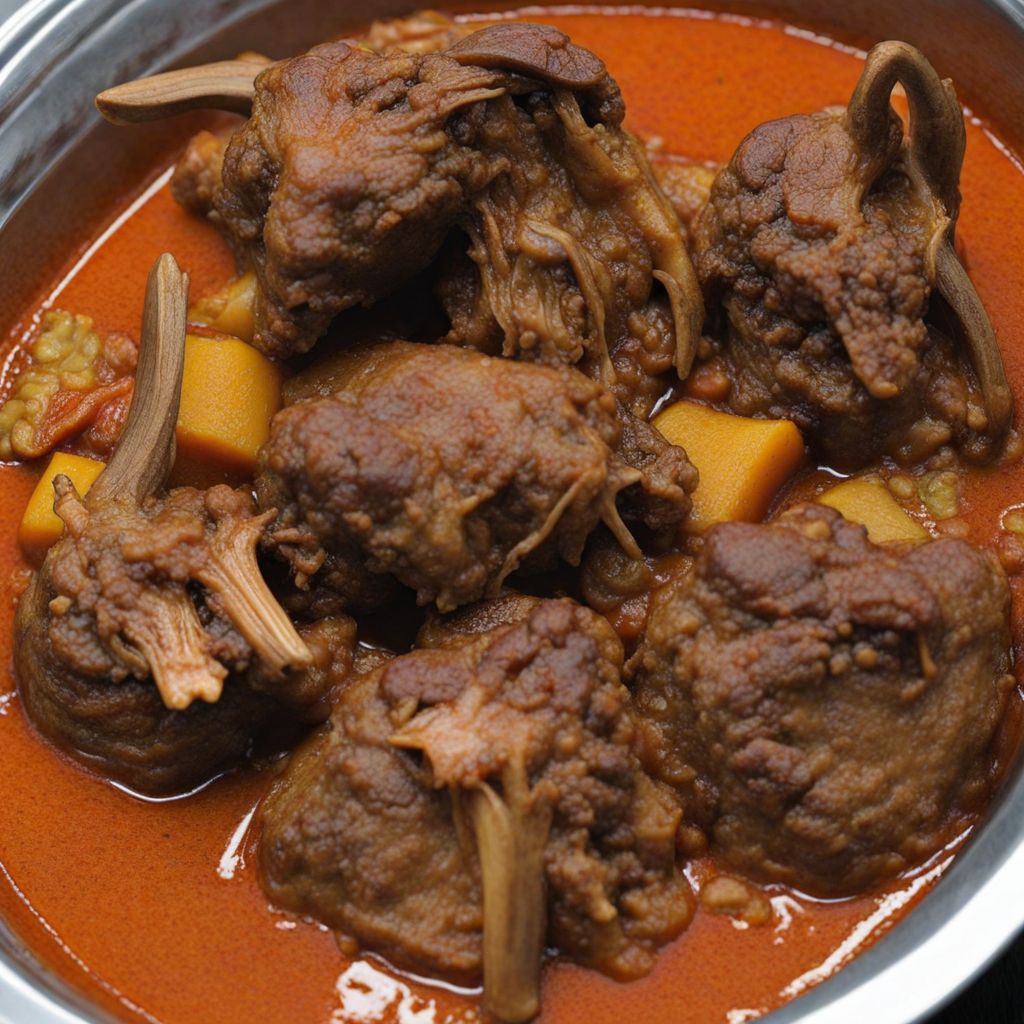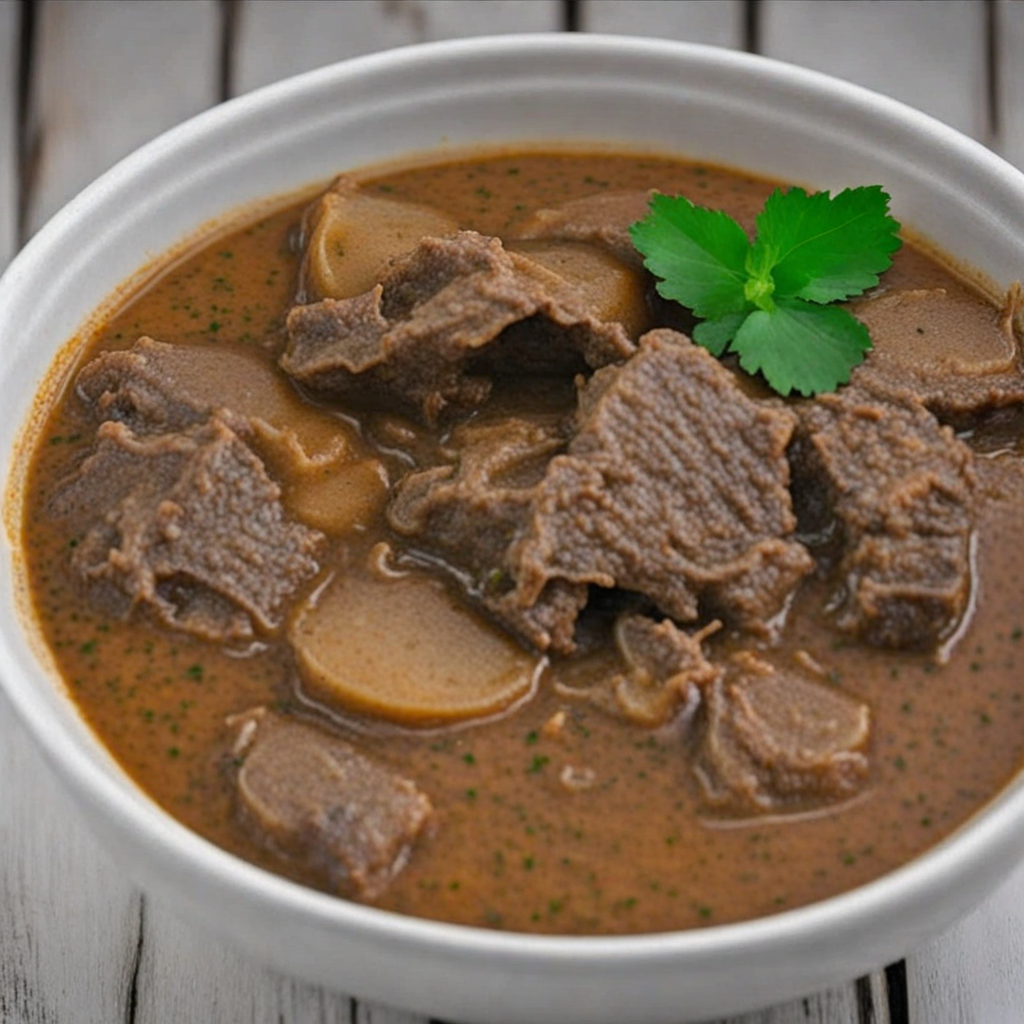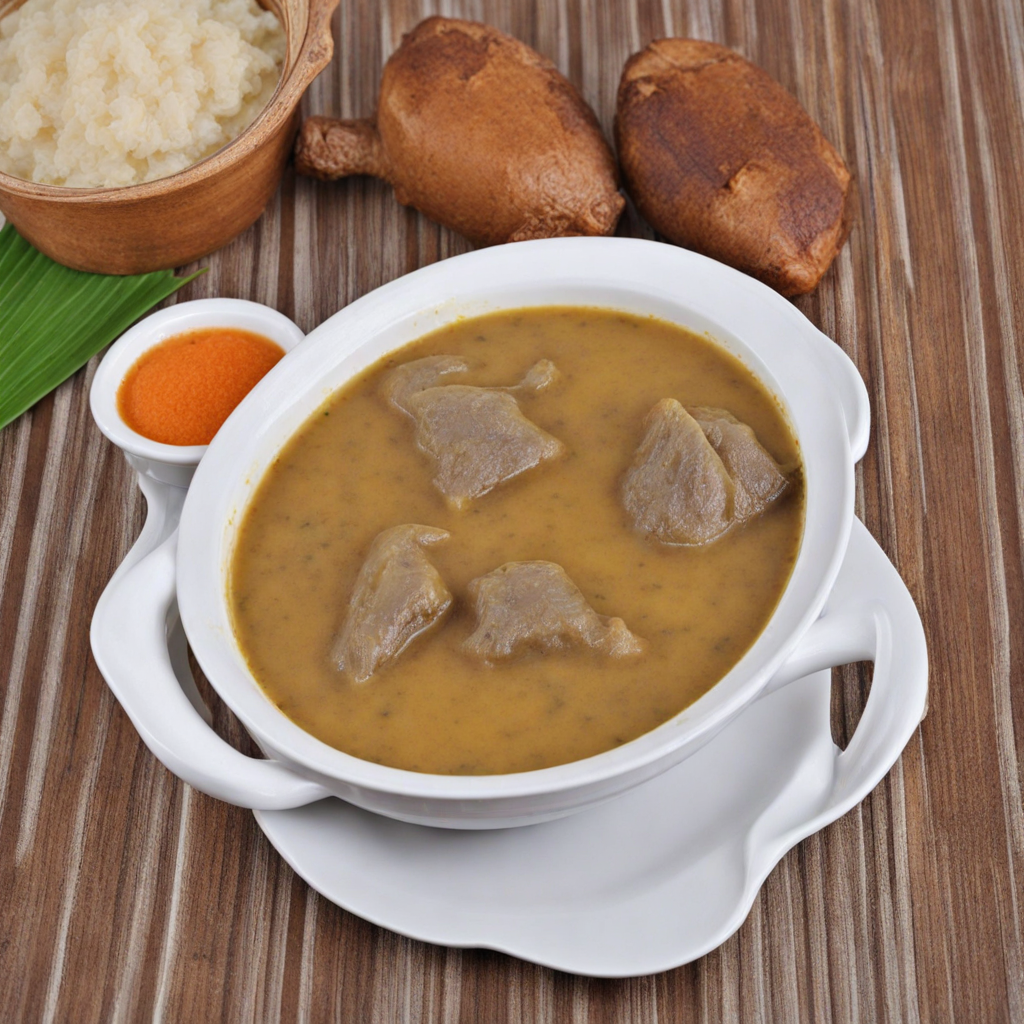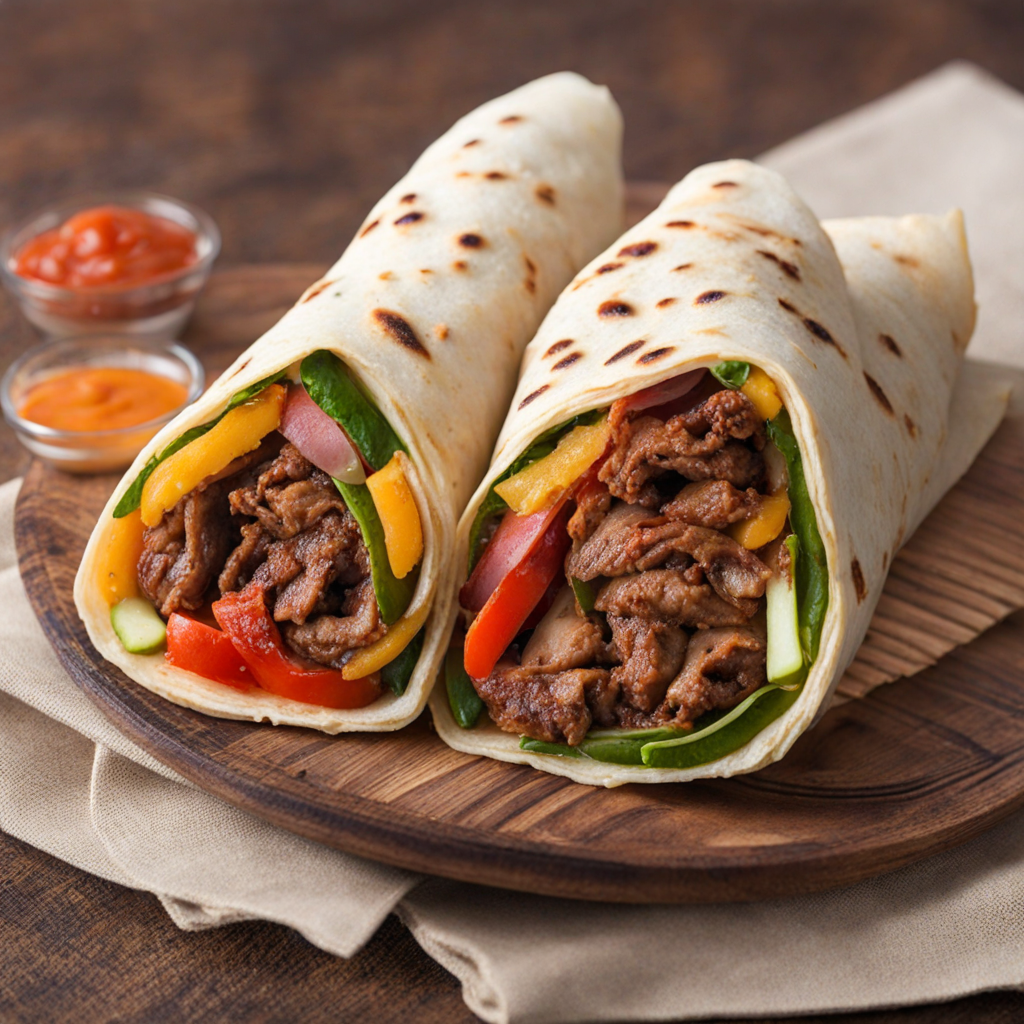Isi Ewu
Isi Ewu is a traditional Nigerian dish that originates from the southeastern region, particularly among the Igbo people. It is a goat head delicacy, prepared with a unique blend of spices and herbs that create a depth of flavor that is both rich and tantalizing. The head is meticulously cleaned, boiled until tender, and then chopped into manageable pieces. The meat is then enveloped in a savory sauce made from ground crayfish, palm oil, and a variety of spices, including pepper, onions, and locust beans, which add a distinct aroma and umami flavor to the dish. What sets Isi Ewu apart is its bold and spicy profile, often enhanced with a pinch of salt and a hint of lemon juice, which balances the richness of the goat meat. Traditionally, this dish is served with a side of chilled palm wine, which complements the heat and adds a refreshing touch to the meal. The presentation is often rustic, with the goat head served in a communal bowl, inviting friends and family to gather around and enjoy the feast together. Eating Isi Ewu is not just about the taste; it’s an experience steeped in cultural significance. The dish is commonly prepared for celebratory occasions, family gatherings, and special events, symbolizing hospitality and community. Each bite offers a unique combination of textures, from the tender meat to the crunchy bits of seasoning, making it a delightful exploration for those eager to dive into the bold flavors of Nigerian cuisine.
How It Became This Dish
The History of Isi Ewu: A Culinary Gem of Nigeria #### Origins Isi Ewu, a traditional dish from Nigeria, particularly associated with the Igbo ethnic group, has a rich history that reflects the cultural tapestry of the region. The name "Isi Ewu" translates directly to "Head of Goat" in Igbo, signifying the dish's primary ingredient. Goat meat has been a staple in many African cuisines, prized not only for its flavor but also for its nutritional value and cultural significance. The use of goat in cooking can be traced back centuries, with its domestication believed to have occurred around 10,000 years ago in the Middle East before spreading to various parts of Africa. In Igbo culture, goat meat is often associated with celebrations, rituals, and communal gatherings. It is a symbol of prosperity and social status. Isi Ewu is typically prepared during significant events such as weddings, traditional festivals, and other communal gatherings, emphasizing the communal nature of Igbo culture. The dish is often accompanied by local beverages like palm wine, enhancing the festive atmosphere. #### Ingredients and Preparation The preparation of Isi Ewu involves carefully selected ingredients that contribute to its unique flavor profile. Traditionally, the goat is slaughtered, and the head is meticulously cleaned and cooked, often with the skin intact. The meat is then seasoned with a robust mix of spices, including pepper, onions, and locust beans, known as "iru." This fermentation of locust beans adds depth and umami to the dish, making it a unique culinary experience. The cooking process often includes boiling the head until tender, after which it is cut into pieces and mixed with a spicy sauce made from ground peppers, onions, and palm oil. The dish is usually garnished with sliced onions and served hot, often in a communal bowl, inviting diners to share in the experience. The communal aspect of eating Isi Ewu is a vital part of its cultural significance, as it encourages togetherness and bonding among family and friends. #### Cultural Significance Isi Ewu holds a significant place in Igbo culture, embodying values of hospitality and community. The dish is more than just a meal; it represents the essence of sharing and togetherness. In many families, preparing Isi Ewu is a communal affair, often involving members of the family or community gathering to assist in its preparation, cooking, and eventual enjoyment. Such gatherings foster strong social bonds and create enduring memories. In traditional Igbo society, goat meat is often reserved for special occasions. Serving Isi Ewu to guests is a mark of respect and honor, symbolizing that they are valued and cherished. It is also common for elders to partake in the first servings, reflecting the hierarchical respect embedded in Igbo culture. Moreover, Isi Ewu plays a role in various ceremonies and rituals. During traditional weddings, the dish might be served to celebrate the union of two families. It is often prepared as part of the "traditional marriage" ceremony, signifying the joining of families and the importance of lineage. The act of sharing Isi Ewu during such events reinforces familial ties and community cohesion. #### Development Over Time As Nigeria has modernized, the preparation and consumption of Isi Ewu have evolved, reflecting broader changes in lifestyle, migration patterns, and culinary influences. The rise of urbanization has led to a shift in how traditional dishes are prepared and consumed. In cities, where access to traditional ingredients may be limited, modern cooks have adapted the recipe, substituting certain ingredients while striving to maintain the authentic taste and experience of the dish. The increased globalization of cuisine has also introduced new influences into traditional cooking. Chefs and home cooks alike are experimenting with fusion recipes that incorporate elements from different culinary traditions, thus broadening the appeal of Isi Ewu beyond its cultural roots. This evolution allows for greater creativity while still honoring the dish's historical significance. The rise of social media has played a crucial role in promoting Isi Ewu and other traditional Nigerian dishes to a wider audience. Food bloggers and influencers showcase the dish through vibrant photographs and engaging stories, sparking interest among younger generations and diaspora communities. This visibility has contributed to the dish's resurgence, as people seek to reconnect with their roots and share their culture with others. #### Contemporary Relevance Today, Isi Ewu remains a cherished dish within Nigerian culture and among the Igbo people. Many families still prepare it for special occasions, ensuring that the tradition is passed down through generations. The dish is also increasingly featured in Nigerian restaurants, where chefs pay homage to traditional methods while introducing innovative twists to attract a broader clientele. Furthermore, Isi Ewu has become a symbol of cultural pride for the Igbo people, representing their culinary heritage in a globalized world. Festivals celebrating Nigerian cuisine often showcase Isi Ewu, highlighting its importance as a cultural icon. These events serve as platforms for sharing not only the dish but also the stories and traditions that surround it, emphasizing the role of food in shaping identity. #### Conclusion Isi Ewu is more than just a dish; it is a reflection of the rich cultural heritage of the Igbo people of Nigeria. Its origins, preparation, and significance reveal the deep-rooted traditions that define communal life and the values of hospitality and respect. As the world continues to change, Isi Ewu adapts and evolves, bridging the gap between past and present while maintaining its status as a beloved culinary treasure. Through every bite, one can taste the history, community, and pride embedded within this iconic dish, ensuring its place in the hearts and homes of many for generations to come.
You may like
Discover local flavors from Nigeria


